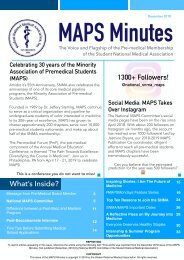JSNMA SUMMER 2019 Sneak Preview
You also want an ePaper? Increase the reach of your titles
YUMPU automatically turns print PDFs into web optimized ePapers that Google loves.
Opinion<br />
21<br />
In my first year of medical school, I was taught how<br />
to assess mental health with an alphabet soup<br />
of acronyms. I practiced how to compassionately<br />
ask patients about anxiety, depression, and suicidal<br />
ideation. Knowing that I am in a profession with high<br />
rates of burnout and suicide, I also trust that if I or<br />
my classmate were to become one of these patients<br />
that our deans, faculty, and fellow classmates would<br />
support and respect us in the same way in which<br />
we have been taught to treat our patients.1 This,<br />
however, requires a more multi-pronged approach at<br />
the institutional level.<br />
The constant stress and unique demands of medical<br />
school, unlike perhaps any other educational process,<br />
can tear away previously established compensatory<br />
mechanisms and reveal or exacerbate an underlying<br />
psychiatric condition. A meta-analysis of 62,728<br />
medical students estimated a 28.0 percent global<br />
prevalence of depression.2 Thus, at an institutional<br />
level, there is merit to offering optional yet confidential<br />
mental health assessments for incoming medical<br />
students, who can then use these preliminary results<br />
to seek additional support early on.<br />
In conjunction with providing counseling services, it is<br />
important to interrogate the relative homogeneity of<br />
student and faculty populations within our profession.<br />
It is impossible to disentangle mental well-being from<br />
one’s identity, whether as a queer woman of color,<br />
a recent immigrant, or an Indigenous person.3 It is<br />
often far easier to disclose sensitive information<br />
with someone who has had similar experiences or<br />
speaks the same language. The strength of these<br />
trusted relationships is what allows minorities to<br />
confide and restore, especially medical students of<br />
color. Thus, it is key for administrators to continue<br />
recruiting and retaining students and faculty with<br />
Continued on page 75<br />
REFERENCES<br />
1. Cook Grossman, D. (2016). Reducing the Stigma:<br />
Faculty Speak Out About Suicide Rates Among<br />
Medical Students, Physicians. Retrieved July 9, 2018,<br />
from https://news.aamc.org/medical-education/<br />
article/reducing-stigma-suicide-rates/<br />
2. Puthran, R., Zhang, M. W. B., Tam, W. W., & Ho, R. C.<br />
(2016). Prevalence of depression amongst medical<br />
students: a meta-analysis. Medical Education, 50(4),<br />
456–468. https://doi.org/10.1111/medu.12962<br />
3. Gengoux, G. W., & Roberts, L. W. (2018). Ethical<br />
Use of Student Profiles to Predict and Prevent<br />
Development of Depression Symptoms During<br />
Medical School. Academic Medicine, 1. https://doi.<br />
org/10.1097/ACM.0000000000002436<br />
4. Hardeman, R. R., Przedworski, J. M., Burke, S.,<br />
Burgess, D. J., Perry, S., Phelan, S., … van Ryn, M.<br />
(2016). Association Between Perceived Medical<br />
School Diversity Climate and Change in Depressive<br />
Symptoms Among Medical Students: A Report from<br />
the Medical Student CHANGE Study. Journal of the<br />
National Medical Association, 108(4), 225–235.<br />
https://doi.org/10.1016/j.jnma.2016.08.005<br />
5. Acheampong, C., Davis, C., Holder, D., Averett, P.,<br />
Savitt, T., & Campbell, K. (2018). An Exploratory<br />
Study of Stress Coping and Resiliency of Black<br />
Men at One Medical School: A Critical Race Theory<br />
Perspective. Journal of Racial and Ethnic Health<br />
Disparities. https://doi.org/10.1007/s40615-018-<br />
0516-8<br />
6. Leyerzapf, H., & Abma, T. (2017). Cultural minority<br />
students’ experiences with intercultural competency<br />
in medical education. Medical Education, 51(5),<br />
521–530. https://doi.org/10.1111/medu.13302<br />
7. Villwock, J. A., Sobin, L. B., Koester, L. A., & Harris,<br />
T. M. (2016). Impostor syndrome and burnout<br />
among American medical students: a pilot study.<br />
International Journal of Medical Education, 7,<br />
364–369. https://doi.org/10.5116/ijme.5801.eac4<br />
A U G U S T 2 0 1 9






